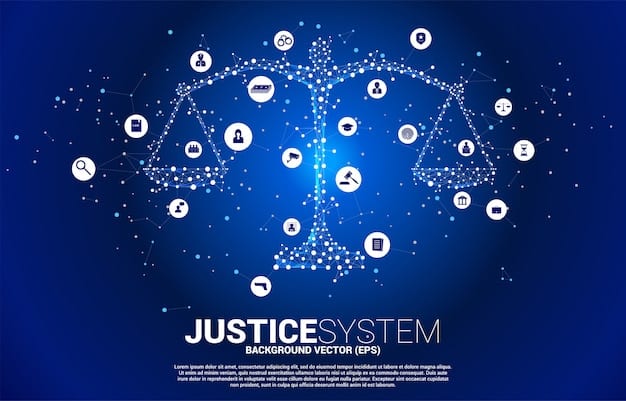The Ethics of AI: Regulations Needed to Prevent Bias in AI Decision-Making

The ethics of AI necessitate robust regulations to prevent bias in AI-driven decision-making, ensuring fairness, accountability, and transparency across various applications from healthcare to finance, thereby safeguarding societal values and individual rights.
The rapid advancement of artificial intelligence (AI) presents immense opportunities, but also significant ethical challenges. Central to these concerns is the potential for the ethics of AI: what regulations are needed to prevent bias in AI-driven decision-making?, which can perpetuate and even amplify existing societal inequalities.
Understanding Bias in AI: A Critical Overview
Bias in AI systems is a pervasive issue that can lead to unfair or discriminatory outcomes. Understanding the sources and types of bias is crucial in addressing the ethics of AI: what regulations are needed to prevent bias in AI-driven decision-making? effectively.
Sources of AI Bias
AI bias can originate from various stages of the AI development lifecycle. Let’s explore some of the key sources:
- Data Bias: AI models are trained on data, and if that data reflects existing societal biases, the model will inevitably learn and perpetuate those biases.
- Algorithm Bias: The algorithms themselves can introduce bias through design choices, such as how they weigh different factors or handle missing data.
- Human Bias: The humans who design, develop, and deploy AI systems can inadvertently introduce their own biases into the process.
Types of AI Bias
Different types of bias can manifest in AI systems. Recognizing these is essential for creating equitable systems:
- Historical Bias: This arises when the training data reflects past inequalities or discriminatory practices.
- Sampling Bias: This occurs when the training data is not representative of the population the AI system will be used on.
- Measurement Bias: This happens when the data used to train the AI system is collected in a way that systematically favors certain groups over others.
Bias in AI can have far-reaching consequences. It’s essential to identify its origins and recognize its various forms, paving the way for more thoughtful and impartial AI development. This is crucial when considering the ethics of AI: what regulations are needed to prevent bias in AI-driven decision-making?
The Importance of Ethical AI Regulations
The establishment of ethical AI regulations is imperative to ensure that AI systems are developed and deployed responsibly. Regulations play a pivotal role in ensuring the ethics of AI: what regulations are needed to prevent bias in AI-driven decision-making?
Protecting Individual Rights
Ethical AI regulations are essential for safeguarding individual rights and freedoms. Here are a few key aspects:
- Preventing Discrimination: Regulations can set guardrails to prevent AI systems from discriminating against individuals based on race, gender, or other protected characteristics.
- Ensuring Transparency: Regulations can require that AI systems are transparent and explainable, so that individuals can understand how decisions are being made about them.
- Maintaining Accountability: Regulations can establish clear lines of accountability for the actions of AI systems, so that individuals have recourse if they are harmed.
Promoting Public Trust
Ethical AI regulations can help to build public trust in AI systems. Why is this important?
- Encouraging Adoption: When people trust AI systems, they are more likely to adopt and use them, leading to greater innovation and economic growth.
- Mitigating Backlash: When people don’t trust AI systems, they are more likely to resist them, potentially leading to social unrest and political instability.
- Fostering Innovation: Regulations that balance innovation with ethics can create a more sustainable and responsible AI ecosystem.
Ethical AI regulations not only protect individuals but also foster an environment of trust and innovation. This balance is crucial for building a future where AI benefits all members of society, while ensuring the ethics of AI: what regulations are needed to prevent bias in AI-driven decision-making?

Current Regulatory Landscape: A Global Perspective
The regulatory landscape for AI is rapidly evolving, with different countries and regions taking different approaches. Let’s examine some key developments in addressing the ethics of AI: what regulations are needed to prevent bias in AI-driven decision-making? worldwide.
European Union’s AI Act
The European Union is at the forefront of AI regulation with its proposed AI Act. Here are some key features:
- Risk-Based Approach: The AI Act categorizes AI systems based on their level of risk and imposes stricter regulations on high-risk systems.
- Transparency Requirements: High-risk AI systems will be required to be transparent about their decision-making processes.
- Prohibited Practices: The AI Act bans certain AI practices that are deemed to be too harmful, such as AI systems that manipulate human behavior.
United States’ Approach
The United States has taken a more sector-specific approach to AI regulation. Here are a few examples:
- AI Risk Management Framework: The National Institute of Standards and Technology (NIST) has developed an AI Risk Management Framework to help organizations manage the risks associated with AI systems.
- Executive Orders: The White House has issued executive orders on AI, focusing on promoting innovation and protecting American values.
- Sector-Specific Regulations: Various federal agencies, such as the Food and Drug Administration (FDA) and the Federal Trade Commission (FTC), have issued regulations on AI in their respective areas.
The global regulatory landscape for AI is complex and constantly changing. Understanding the different approaches being taken by different countries and regions is essential for navigating this evolving landscape effectively and ensuring the ethics of AI: what regulations are needed to prevent bias in AI-driven decision-making?
Key Principles for Effective AI Regulation
Effective AI regulation requires a set of guiding principles that ensure fairness, transparency, and accountability. These principles are crucial for shaping the ethics of AI: what regulations are needed to prevent bias in AI-driven decision-making?
Fairness and Non-Discrimination
AI regulations should prioritize fairness and non-discrimination. Here’s how:
- Data Diversity: Regulations should encourage the use of diverse and representative data sets to train AI systems.
- Bias Mitigation: Regulations should require that AI systems are regularly audited for bias and that steps are taken to mitigate any bias that is found.
- Equal Outcomes: Regulations should aim to ensure that AI systems do not produce discriminatory outcomes, even if they are not explicitly biased.
Transparency and Explainability
Transparency and explainability are paramount. Why are they important?
- Explainable AI (XAI): Regulations should encourage the development of AI systems that can explain their decisions in a clear and understandable way.
- Auditability: Regulations should require that AI systems are auditable, so that their decision-making processes can be reviewed and scrutinized.
- Open Data: Regulations should promote open data initiatives to make it easier for researchers and the public to understand how AI systems work.
Implementing these key principles is vital for creating AI regulations that promote fairness, transparency, and accountability. This, in turn, fosters greater trust and confidence in AI systems, crucial for addressing the ethics of AI: what regulations are needed to prevent bias in AI-driven decision-making?
Challenges in Implementing AI Regulations
Implementing AI regulations is not without its challenges. Overcoming these obstacles is crucial to harness AI’s benefits while mitigating its risks and ensuring the ethics of AI: what regulations are needed to prevent bias in AI-driven decision-making?
Technical Complexity
AI systems are often technically complex, making it difficult to regulate them effectively. Consider these factors:
- Evolving Technology: AI technology is constantly evolving, making it difficult for regulators to keep up.
- Lack of Expertise: Regulators may lack the technical expertise needed to understand how AI systems work and how they can be biased.
- Data Privacy: AI systems often rely on large amounts of data, which raises concerns about data privacy and security.
Enforcement
Enforcing AI regulations can be challenging. Here are some key hurdles:
- Limited Resources: Regulators may lack the resources needed to effectively monitor and enforce AI regulations.
- Cross-Border Issues: AI systems often operate across borders, making it difficult to enforce regulations consistently.
- Lack of Precedent: There is a lack of legal precedent for AI regulations, making it difficult to interpret and apply them.
Addressing these challenges is essential for creating AI regulations that are both effective and enforceable. Overcoming these hurdles is crucial for addressing the ethics of AI: what regulations are needed to prevent bias in AI-driven decision-making?

Future Directions: Towards Responsible AI Governance
The future of AI governance requires a collaborative and adaptive approach. As AI technology continues to advance, it is essential to refine our regulatory strategies to match. We need to prioritize the ethics of AI: what regulations are needed to prevent bias in AI-driven decision-making?
Multi-Stakeholder Collaboration
Effective AI governance requires collaboration among stakeholders. Here’s why:
- Government: Governments play a crucial role in setting the regulatory framework for AI.
- Industry: Industry can contribute technical expertise and best practices to the regulatory process.
- Civil Society: Civil society can represent the interests of the public and ensure that AI regulations are fair and equitable.
Adaptive Regulation
Adaptive regulation is key for the evolving AI landscape. Here’s what that entails:
- Sandboxes: Regulatory sandboxes can allow companies to test new AI technologies in a controlled environment.
- Agile Regulation: Regulations should be flexible to adapt to new developments in AI technology.
- Continuous Monitoring: Regulations should include mechanisms for continuously monitoring the impact of AI systems and making adjustments as needed.
By embracing multi-stakeholder collaboration and adaptive regulation, we can create an AI governance framework that is both effective and sustainable, properly addressing the ethics of AI: what regulations are needed to prevent bias in AI-driven decision-making?
| Key Aspect | Brief Description |
|---|---|
| ⚖️ Preventing Bias | Regulations should mitigate bias in AI algorithms and data. |
| 🛡️ Protecting Rights | Safeguarding individual rights through AI regulatory oversight. |
| 🌐 Global Standards | Harmonizing AI regulations for cross-border AI applications. |
| 🤖 Adaptive Policies | Policies must adapt to rapidly evolving AI technologies. |
Frequently Asked Questions (FAQ)
▼
AI bias can lead to unfair or discriminatory outcomes, perpetuating existing societal inequalities. It affects areas like healthcare, finance, and criminal justice, undermining trust and fairness.
▼
Sources include biased training data, algorithm design choices, and the biases of human developers. Historical, sampling, and measurement biases are common types to look out for.
▼
Regulations prevent discrimination, ensure transparency in AI decision-making, and establish accountability for AI system actions. This protects individuals from unfair treatment.
▼
Key principles are fairness, non-discrimination, transparency, and explainability. Regulations should mandate bias mitigation, use of diverse data, and easily understandable AI.
▼
Challenges include technical complexity, evolving technology, lack of expertise among regulators, data privacy concerns, limited resources, and cross-border issues in enforcement.
Conclusion
Addressing the ethics of AI through effective regulations is paramount to ensuring fairness, transparency, and accountability in AI-driven decision-making. Global collaboration, adaptive regulatory frameworks, and a commitment to ethical principles are essential to harness the benefits of AI while mitigating its potential risks.





